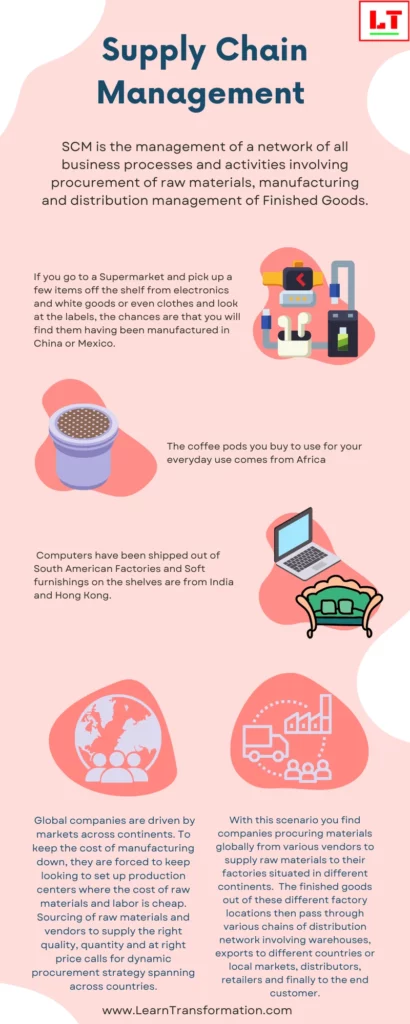“The supply chain stuff is really tricky.”
Elon Musk, CEO of Tesla and SpaceX.
Supply Chain Management (SCM) is the management of a network of all business processes and activities. That involves the procurement of raw materials, and manufacturing and distribution management of finished goods.
Supply Chain Management
In commerce, supply chain management is the management of the flow of goods and services, between businesses and locations, and includes the movement and storage of raw materials, of work-in-process inventory, and of finished goods as well as end to end order fulfillment from point of origin to point of consumption. In this article, we have mentioned some books on supply chain management that a leader should read.
We assure you that you will receive a World-Class Learning Experience on all Transformational topics. Such as Leadership Transformation, Business Transformation, Digital Transformation, Strategy Transformation, Quality Transformation, Operational Transformation, Supply Chain Transformation, HR Transformation, Financial Transformation, Lean Transformation, Supply Chain books and many others…
Leader’s Tip:
Promote cooperation: To improve coordination and problem-solving, promote cross-functional teamwork and open communication among supply chain partners.

7 Best Books On Supply Chain Management:
The extensive manual “A Handbook of Business Transformation Management Methodology” explores the methodology, and tactics for managing business change. It offers a methodical way to handle the difficult organisational transition process. The book’s main points include the following:
- Transformation approaches: The book examines different business transformation approaches and provides information on their advantages, disadvantages, and actual use. It aids readers in determining which strategy best supports the objectives of their organisation.
- Change Management: Any business transformation must be successful in order to be successful. In order to reduce resistance and ensure smooth transitions, the book examines change management tactics and strategies.
- Business transformation should be in line with the strategic goals of the organisation. The need of coordinating transformation initiatives with the business strategy is emphasised throughout the book in order to produce outcomes.
- Case Studies: The book provides actual case studies from real businesses that show how successful changes may be made. These case studies provide useful illustrations and takeaways from organisations that have undergone substantial change.
“A Handbook of Business Transformation Management Methodology” is a useful tool for executives and specialists working to implement organisational change. It offers a methodical way to manage the challenges of corporate transformation and get the desired results.
A resource that explores supply chain management is “Supply Chain Management: Fundamentals, Strategy, Analytics & Planning for Supply Chain & Logistics Management”. The book, written by Robert J. Handfield and Kevin P. McCormack, provides a thorough overview of supply chain ideas, tactics, analytics, and strategy. The book’s main points include the following:
- The fundamentals are examined in the book’s chapters, along with the significance of integration and alignment with corporate objectives.
- Supply Chain Strategies: It explores supply chain strategies, such as demand-driven, lean, and agile supply chains, and explains when and how to use each one.
- Supply Chain Analytics: It places a emphasis on how technology and data analytics may be used to optimise processes. It examines the application of analytics to inventory control, performance evaluation, and demand forecasting.
- Production planning, demand planning, and distribution planning are few of the planning processes that are covered in supply chain planning. Readers can out useful planning techniques and learn how to adjust to shifting market conditions.
“Supply Chain Management: Fundamentals, Strategy, Analytics & Planning for Supply Chain & Logistics Management” is a manual for those who want to understand the supply chain management. It provides valuable information for those aiming for success in the sector, covering fundamental principles to advanced analytics.
Also read: Supply Chain Management – The Successful Strategies
3. ISE Supply Chain Management
The book “ISE Supply Chain Management” offers a thorough analysis of the ideas and methods used in supply chain management. Readers gain insights into supply chain strategies, optimization, and decision-making from the book authored by David Simchi-Levi, Philip Kaminsky, and Edith Simchi-Levi. The book’s main points include the following:
- The book’s first section, “Supply Chain Fundamentals,” introduces readers to the core concepts and elements of supply chain management. The essential components—suppliers, manufacturers, distributors, retailers, and customers—are described.
- Supply Chain Strategies: Several supply chain strategies, such as cost-effective supply chains, responsive supply chains, and risk-resilient supply networks, are discussed. They outline how organisations can select the best strategy in light of their objectives and the state of the market.
- The book dives deeply into the crucial aspect of demand forecasting. For inventory control and production scheduling, readers learn about techniques and instruments for precise demand forecasting.
- Inventory Management: A key theme is efficient inventory management. The authors look at ways to balance supply and demand, reduce carrying costs, and achieve optimal inventory levels.
In conclusion, “ISE Supply Chain Management” presents a thorough and analytical method for supply chain management. It gives readers the information and resources they need to understand the intricacies of today’s global supply chains, make wise decisions, and optimise supply chain operations. This book offers insightful information for managing and enhancing supply chains, whether you’re a student or a supply chain professional.
4. Supply Chain Management: A Global Perspective
The book “Supply Chain Management: A Global Perspective” offers an in-depth, international perspective on supply chain management procedures. The book’s author, Nada R. Sanders, highlights the significance of sustainability and ethical issues while examining the difficulties and complexities of managing supply chains on a worldwide scale. The book’s main points include the following:
- Introduction to Global Supply Chains: This book section introduces readers to supply chain management basics and the challenges of international supply chains.
- Globalisation and International Trade: It explores global supply chain effects, emphasizing global trade, cross-border logistics, and cultural diversity.
- The book delves into supply chain management’s strategic aspects: design, alignment with corporate goals, and gaining a competitive edge through efficient tactics.
- Integration of the supply chain: It emphasizes the importance of cooperation and integration throughout the supply chain. The book looks at ways to enhance communication between manufacturers, distributors, suppliers, and consumers.
In conclusion, “Supply Chain Management: A Global Perspective” provides an in-depth analysis of the complexities of international supply chain management. It addresses sustainability, ethics, risk management, and the role of technology while providing readers with the information and techniques necessary to manage supply chains on a global scale efficiently. Hence, for professionals and students who want to succeed in this industry, this book is an invaluable resource.
5. Introduction to Supply Chain Management (502 Non Fiction Series Book 4)
The “502 Non Fiction Series” title “Introduction to Supply Chain Management” offers as a primer on the ideas and principles of supply chain management. Additionally, the book, written by Asad Ullah, attempts to give readers a basic comprehension of supply chain fundamentals. The book’s main points include the following:
- Basics of Supply networks: The book starts off with a description of what supply networks are and why they are crucial to contemporary corporate operations.
- Supply Chain Components: It examines the relationships between the different supply chain elements, such as suppliers, manufacturers, distributors, retailers, and customers.
- Key Supply Chain Processes are covered in the book, including demand forecasting, procurement, production planning, inventory management, and logistics.
- Supply Chain Optimisation: The idea of enhancing the effectiveness and cost-effectiveness of supply chain operations is introduced, along with methods for attaining optimisation.
“Introduction to Supply Chain Management” is a easy-to-read manual that exposes readers to the fundamentals of supply chain management. Further, it offers fundamental understanding of the elements, procedures, optimisation, integration, inventory control, and performance measurement of the supply chain. Even while it may not go into great detail on more complicated subjects, it might be a good place to start for anyone hoping to understand the essentials of supply chain management in an easy-to-understand way.
Leader’s Tip:
Adopt technology: Place a focus on using sophisticated analytics, automation, and digital technologies to improve visibility and streamline supply chain procedures.
6. Operations and Supply Chain Management for MBAs
The comprehensive textbook “Operations and Supply Chain Management for MBAs” was written specifically for MBA students by Jack R. Meredith and Scott M. Shafer. Additionally, this book thoroughly explains and makes the concepts, methods, and tactics of operations and supply chain management applicable. The book’s main points include the following:
- Operations and supply chain management overview: The book opens with a summary of the significance of operations and supply chain management in today’s business climate, placing special emphasis on their influence on an organization’s profitability and competitiveness.
- Supply Chain Design and Strategy: It examines the strategies of supply chain management, such as network setup, supply chain design, and matching supply chain strategies.
- The book explores demand forecasting strategies and approaches, offering insights into how businesses can precisely predict client demand and adjust their operational plans accordingly.
- Inventory Management: A major theme is efficient inventory management. The writers go on holding cost optimisation models, inventory control rules, and methods for satisfying client demand while reducing holding costs.
Also read: Supply Chain 4.0 And Logistics 4.0 – The Major Difference
For MBA students looking to build a solid foundation in operations and supply chain management, “Operations and Supply Chain Management for MBAs” provides as a thorough and in-depth resource. Thus, it covers a range of issues and offers examples from real-world situations to highlight important ideas.
7. ISE Operations and Supply Chain Management: The Core
F. Robert Jacobs and Richard B. Chase are the authors of the thorough textbook “ISE Operations and Supply Chain Management: The Core”. Moreover, this book thoroughly explores the fundamental ideas and principles of operations and supply chain management. The book’s main points include the following:
- Introduction to Operations and Supply Chain Management: This chapter gives a general introduction to operations and supply chain management, as well as an analysis of how they affect organisational performance.
- Design and Strategy of the Supply Chain: This section examines the strategic facets of supply chain management, including design, network setup, and alignment with corporate goals.
- Demand Forecasting and Planning: The authors explore demand forecasting and its importance in supply chain planning.
- Inventory Management: Effective inventory management techniques are covered, including order quantity estimation, safety stock, and inventory control models.
In conclusion, “ISE Operations and Supply Chain Management: The Core” is a solid and well-rounded textbook that offers a thorough understanding of the basic ideas and procedures of operations and supply chain management. Thus, it covers industry trends, equipping students to succeed in these vital business management areas.
Key Takeaways
- Process streamlining: Supply chain management strives to optimise the flow of resources, data, and money, leading to increased effectiveness and lower costs.
- Customer-centric strategy: A successful supply chain must prioritise customer pleasure through prompt delivery, high-quality goods, and response.
- Continuous improvement: To stay competitive in a dynamic corporate environment, regularly evaluate and change supply chain strategy while embracing innovation and adaptability.
FAQs
What are the benefits of effective supply chain management?
Effective supply chain management leads to reduced costs, improved customer satisfaction, increased profitability, enhanced competitiveness, minimized risks, better resource utilization, and increased operational efficiency.
How can companies improve their supply chain management?
Companies can improve their supply chain management by implementing effective planning and forecasting, adopting advanced technologies, fostering collaboration, optimizing inventory levels, embracing sustainability practices, and continuously evaluating and improving processes.
Must Watch : 👇

